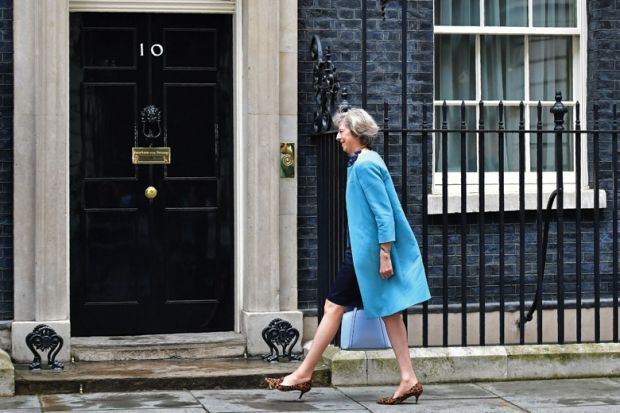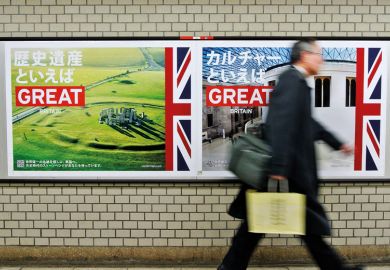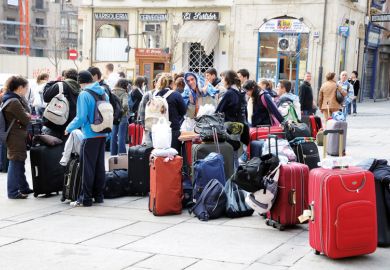I have come to Himachal Pradesh in the Himalayan foothills and am talking to young Indian students thinking about their international education. But their newspapers are full of stories about how UK prime minister Theresa May’s government in the UK does not want them and how a “secret” report on student immigration, locked away in the Home Office, shows that as few as 1 per cent of them have broken the terms of their visas by refusing to leave after their course ends.
Some of them have cousins who have been thrown out of the UK for attending so-called “bogus” colleges. All of them believe that their work options after study is completed are now far brighter elsewhere than the UK. A lot of them feel straightforward rejection.
Elsewhere on the same front pages, however, is news that Russian president Vladimir Putin has arrived down the road in Goa for a summit about the BRICS nations (Brazil, Russia, India, China and South Africa), and during a break in proceedings made time to “ink defence deals”, as the Indian press so graphically put it, worth billions of dollars with Indian prime minister Narendra Modi and his government.
The Putin PR machine – as efficient a weapon as I have known in political press management – is making it known that the judo-loving leader of Russia and the yoga-loving leader of India can forge a lasting bond for the long-term welfare of the Indian nation.Young leaders from the subcontinent, so the subliminal message goes, should be willing to look east towards Moscow rather than west towards Washington and London for their futures.
It doesn’t matter where they are educated so long as they know who their friends really are.
The UK is not only losing the economic argument over international students; that priceless political soft power, which for generations has been one of the greatest assets arising from British education, is being trashed by a Conservative government that has been making decisions based on spurious evidence collected by part-time researchers talking to tired travellers as they arrive at and depart from our airports.
Although the new report on student numbers has been locked away, what the government has admitted is that previous statistics used were merely mathematical extrapolations taken from the International Passenger Survey. There have been no data from actual exit checks, because such checks had previously been abolished. It is a scenario of spin worthy of Putin’s boys, and solely to make a narrow political point.
British Council statistics show us that dozens of world leaders have completed at least part of their education in Britain over the years. Currently, the leaders of Australia, the Bahamas, Colombia, Denmark, Hungary, the Republic of Ireland, Namibia, Singapore, Tonga and even Zimbabwe (well, every teacher is allowed one failure) have received the benefit of British educational excellence, which goes well beyond just delivering academic ability.
Our values of independent thought, intelligent and free speech, especially when challenging dogma and hierarchy, are an essential part of our higher educational DNA, which not only keeps Britain as a tolerant nation but has helped keep large parts of the world as friends and allies. Putin knows that is now under threat, and that is why he is not so subtly exploiting the post-Brexit mess.
During the EU referendum debate, I attended a political dinner hosted by one of the Tory fast-rising MPs and, when invited, publicly challenged the former chancellor Lord Lamont, a vociferous pro-Brexiteer, about why Putin was reportedly keen on securing a vote that would see the UK leave the EU.
He spent the first five minutes of his answer trying to knock me off a perch he thought I had occupied, so affronted was he about such an inconvenient question. But he knows the immense political value to the Kremlin of division and political ineptitude in the West.
There is momentum building against the government’s anti-international student positioning. A leader in The Times earlier this month argued that at a time when the UK government should be doing all it can to attract high-calibre foreign students, it is actually deterring them with tough visa rules based on false assumptions. It called for May to abandon the position without delay.
If she values her reputation as a “fixer”, May can make an immediate start by publishing the real data on the numbers of students disappearing.
And she can go further. She can call the UK’s vice-chancellors to a summit, attended by the foreign secretary, who, as I have said previously, wants an outward-looking Britain that attracts the world’s top talent. After giving them a tour of 10 Downing Street – an unfamiliar place to many of them, regrettably – she can tell them over tea that she does actually want Britain’s higher education institutions to educate the future leaders of the world.
If the entertainment budget stretches to a second cup, she might even ask them how they think she could help them do that.
Of the young Indians I spoke to (not far, in fact, from the best tea-producing region in India), there was not much enthusiasm for Britain any more. A few years ago, about half of those young Indians thinking about an international higher education would have come without a second thought to a UK university. Today, I fear, it is far fewer.
Australia, New Zealand, Canada, the US and Ireland are soaking up the rest. Such places live and learn in the English language. In various ways, they are all expressing their fondness for young people with strong intellectual ability, and they value the ongoing contribution that can be made in their societies by such visitors.
Perhaps above all, and this could be significant, the perception among the young Indians is that none of those competing countries regards incoming international students as unworthy “immigrants”. That has been allowed to become such a pejorative word in our language and in this debate. What has happened to simple British decency? Has that, too, been overtaken by the Brexiteers?
International students are welcome visitors. Only if May can shift that perception can she justify the Tories no longer being called the “nasty” party. Until she does, I am sorry to say that the cap still fits.
David Boddy was political press secretary to former UK prime minister Margaret Thatcher and is head of schools partnerships at SI-UK Education Council, which helps international students to apply to UK universities.
Times Higher Education will host its BRICS & Emerging Economies Universities Summit at the University of Johannesburg from 30 November to 2 December.
Register to continue
Why register?
- Registration is free and only takes a moment
- Once registered, you can read 3 articles a month
- Sign up for our newsletter
Subscribe
Or subscribe for unlimited access to:
- Unlimited access to news, views, insights & reviews
- Digital editions
- Digital access to THE’s university and college rankings analysis
Already registered or a current subscriber?




